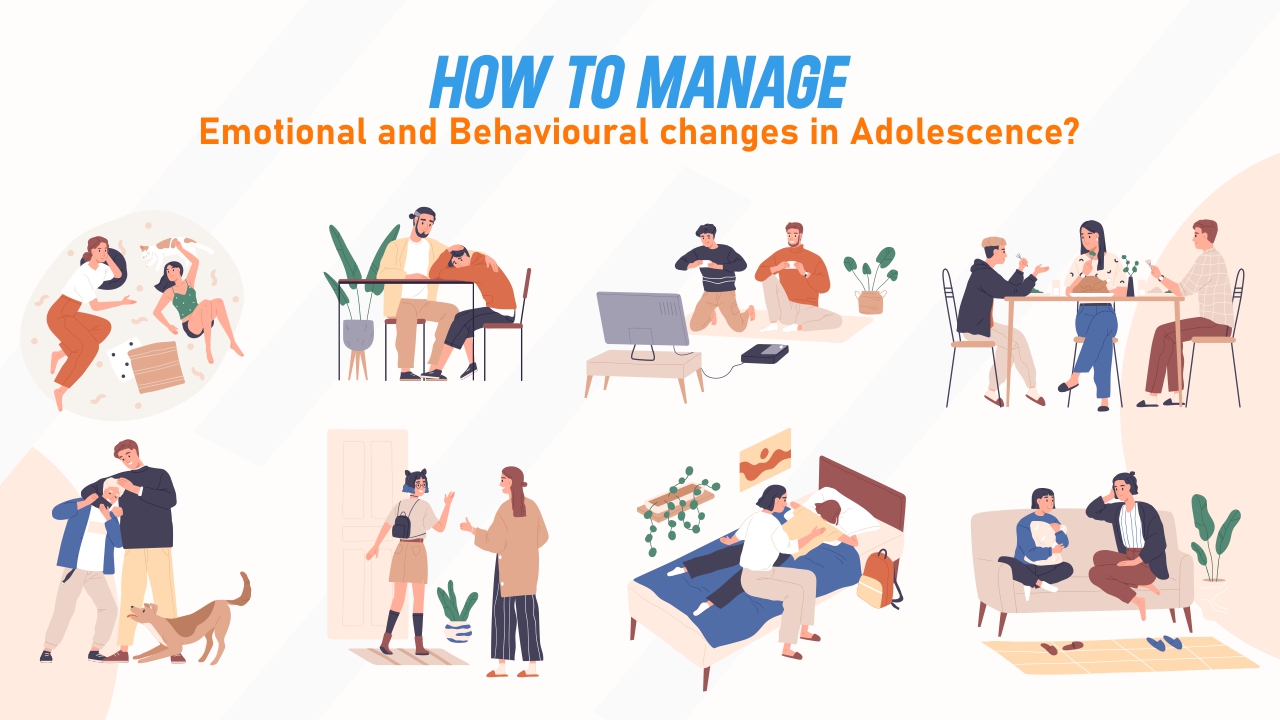There comes a period of time in a kid’s life when they are roughly 10 years old when they start feeling different than normal. They start showing various changes physically, mentally, emotionally, and psychologically. This greatly affects their regular behaviour. This time is particularly challenging for the parents, as sometimes it is noticed that they struggle to understand the reasons for these changes in behaviour and misread them as normal temper tantrums from a kid. If your kid is going through the same thing or is about to enter this age bracket, then this blog is for you.
We will help you understand how to manage your kids emotional and behavioural changes in adolescence. Here we have, in simple words, answers to your questions like what adolescence is, what changes you might expect, and how you can ease or help your child while they go through this extremely confusing time.
What is adolescence, and what are the changes in adolescence?
According to the WHO, “adolescence is the phase of life between childhood and adulthood, from ages 10 to 19.” This is the period where kids witness rapid physical, mental, and psychological development. During adolescence, individuals may experience rapid growth, where they can grow several inches within a few months. This growth phase may be followed by a period of slow growth before another growth spurt occurs.
This age bracket may slightly vary depending on the biological sex of the child. Females usually go through changes in adolescence roughly a year earlier than males. The period of changes in adolescence may start early or late in different individuals, and there is not much to worry about. However, if you feel that the timing is highly unusual, as in, it has started way early or is getting really late, then you might want to consult a paediatrician.
During this time, your kids will mature both physically and sexually; if they are unaware of this phenomenon, it could easily lead to confusion, anxiety, shyness, and various other social complexes. They might also be embarrassed by these changes. This will eventually lead to emotional and behavioural changes in your kids.
Emotional and behavioural changes in adolescence include the following:

• A growing desire for increased independence from parents
• Phases of frustration and negativity
• The emergence of abstract thinking abilities
• Heightened self-consciousness and sensitivity
• Greater influence from peers and social circles
• The tendency to compare oneself with others
• Fluctuations in energy levels and sleep patterns
• The development of a longing for romantic relationships
• The maturation of decision-making skills
At this time, your job is to provide guidance, support, and comfort. But how will you do that? Keep reading, and we will provide you with just enough answers.
How can parents manage behavioural and emotional changes during adolescence?
Keep your Kids Informed:

One of the most common causes of anxiety among adolescent teens is that they don’t fully understand the changes they are going through. They may understand the concept of physical growth, but other changes, such as sexual, emotional, and psychological, might be complicated for them.
Your strategy to deal with behavioural and emotional changes in adolescence should be to keep your kids informed. Have a talk with them, make them understand the expected changes, and clear their doubts. The message that there is nothing unusual about it and that everyone goes through it should be made clear. This will help them dodge any feelings of awkwardness that they might have.
Encourage them to talk:
If your kids believe that they can talk to you about anything, including these changes, then they won’t hesitate to come to you for help. Due to their recently developed sensibilities, they might overthink about a certain incident with their friends, about the way they look, about their scores compared to others, and many other things. By providing a nurturing and protective environment, you can help your child navigate these emotional and behavioural changes in adolescence. If they talk to you, you can help them effectively cope with the various challenges they encounter, such as mounting academic expectations, peer pressure, and personal and social changes.
Ensure that their self-confidence is not affected:

During these times, kids might feel that they are being watched constantly by their peers; this can lead to increased consciousness about the way they look, talk, and dress. Although they long for independence from their families at this time, they also feel insecure and struggle to face social pressures.
During these times, if they get encouragement from their parents and are motivated to look past these things and focus on their personal growth, then it will help them immensely. Parents can encourage their kids to take on new challenges, learn new skills, and try new sports. This will help with their personality development. When they take up a new skill or a sport, not only will they learn values related to it, but they will also feel more accomplished. Eventually, this will add to their self-confidence and their behaviour around their social circle.
Find a balance with their temper tantrums
As mentioned before, it is normal for kids during adolescence to feel angry or frustrated and lash out at you or others in the family. During these times, it is important that you do not lose your cool. Your behaviour at these times will act as a model for them as to how to manage confrontations. Try to hear what it is that bothers them and find a solution for it. It is also equally important that you do not give in to every illogical tantrum of your child.
You do not want them to develop a behaviour where they lash out at everyone if things do not go their way; dealing with disappointments is also an important part of growing up. The right balance needs to be there. Draw a line and be very clear about the type of behaviour that is acceptable.
Do not overindulge
It is one of the most common complaints among kids during adolescence that their parents tend to overindulge in their affairs. Whether some of it is necessary or not, they fail to understand. Even when your intentions are to help them and guide them through this time, it is important that you do not come out too strongly. Your kids may or may not be ready to discuss these issues with you right away. Like many, they may feel embarrassed or shy.
What you can do in these situations is encourage them to talk to other trusted adults of their choice. This adult can be their aunt, uncle, teacher, or counsellor at the school. Meanwhile, you can try to spend time with them, talk to them about their interests, and share with them yours.
Conclusion

In order to assist your teenager in managing the confusion and anxiety that come with changes, it is essential to address their fear of the unknown. Encourage them to talk or read to get a better understanding of what they are going through. Try to create a positive perspective out of this; they can view these emotional and behavioural changes in adolescence as an opportunity for personal growth, skill development, and learning.
Taking care of their physical well-being is also crucial during this time. Ensure that your teenager receives sufficient sleep, proper nourishment, and regular exercise. A healthy mind and body are better equipped to handle unexpected situations and adapt to change. Reading parenting books can also help you. Here are some of the most recommended parenting books that focuses on teens:
1. Parenting Teens with Love and Logic: Preparing Adolescents for Responsible Adulthood by Foster Cline, MD & Jim Fay
2. The 5 Love Languages of Teenagers: The Secret to Loving Teens Effectively by Gary Chapman
3. Brainstorm: The Power and Purpose of the Teenage Brain by Daniel J. Siegel MD
4. The Grown-Up’s Guide to Teenage Humans: How to Decode Their Behavior, Develop Trust, and Raise a Respectable Adult by Josh Shipp
5. Blame My Brain: The Amazing Teenage Brain Revealed by Nicola Morgan.
As it is a period of significant cognitive growth for them, you can recommend your favourite books and movies and have long discussions and debates regarding characters, motivations, themes, etc. Remember, it will feel like a problem only if you treat it like one, take it up as a challenge, and give it your best.

My child gets angry in just small talks . He is a teenager how to deal with it